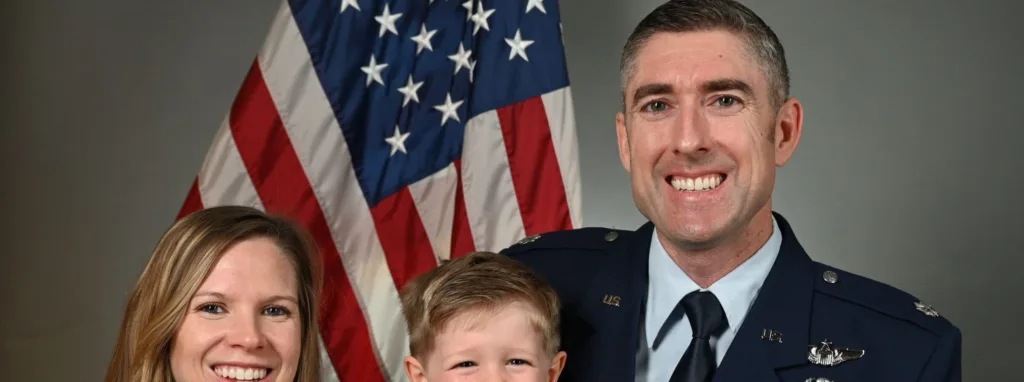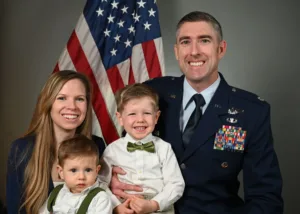Every May, the ALS community observes ALS Awareness Month, an observance created by the ALS Association to bring communities together to raise awareness of the condition, share stories from people living with ALS and show support for caregivers, families and care workers. This observance also shines a spotlight on those who dedicate their lives to finding a cure.
According to the National Institute of Neurological Disorders and stroke, amyotrophic lateral sclerosis (ALS) is a progressive neurological condition affecting motor neurons in the brain and spinal cord, which control voluntary muscle movements like breathing. As motor neurons deteriorate, they stop sending signals to muscles, leading to weakness, twitching and atrophy. Over time, individuals lose the ability to walk, speak, chew and breathe. While the U.S. Food and Drug Administration has approved several medications to help manage symptoms, slow progression and extend survival, there is currently no cure or treatment known to stop or reverse the effects of ALS, says the National Library of Medicine.
In this article, you’ll meet Thomas Brittingham, a veteran living with ALS, who’s career in the U.S. Military was taken from him due to this terrible disease.
A look back on Thomas’ service
From his time in the U.S. Coast Guard to his years as a U.S. Air Force pilot, Thomas Brittingham’s career was dedicated to service and high-stakes missions, including 980 combat hours with four deployments, drug busts off the coast of Mexico, dive operations and foreign vessel seizures across the Western Pacific.
During his 14 years in the U.S. Air Force, he served as a pilot and flew F-16s and KC-135s for air-to-air refueling. In his five years serving the U.S. Coast Guard, Thomas was a boarding officer, diver and captain of a ship.
Thomas had prevailed through perilous situations that many of us could never imagine, but when he was diagnosed with sporadic limb onset ALS on March 19, 2024, a new battle began—one that was as humbling as it was difficult, showing him the importance of leaning on available support systems, especially home health care services. He learned through his diagnosis that it’s vital for active duty service members and veterans to understand their resources. Here’s his story, the lessons he learned and the advice he wishes he heard sooner.
Finding the right home health care
When facing an ALS diagnosis, the sheer scale of what services and support you need isn’t immediately clear. Thomas and his wife learned this the hard way. Initially, his hospital team set them up with in-home physical therapy (PT) and occupational therapy (OT) through a local company. Through his experience with this company, Thomas learned an important lesson about advocating for better care.
Thomas and his wife then returned to the hospital and consulted his case managers for suggestions to improve his care and they told him about continuous care. He was eager to try home care because as his condition progressed, he realized he needed more help and intermittent home health wouldn’t be enough.
“We found Maxim and started receiving the quality care that would become a lifeline for my family,” says Thomas. “Maxim set us up with skilled respite care that covered eight hours a day, five days a week, through TRICARE’s Injured Service Member benefits,” which are only available to active duty military members.
How home care improved Thomas’ quality of life
Continuous nursing care from Maxim Healthcare Services became essential. Without it, Thomas says he and his wife wouldn’t have been able to maintain any quality of life. This care hasn’t just improved Thomas’ physical well-being; it’s given him and his wife emotional relief.
“Knowing I have skilled professionals by my side, monitoring my needs around the clock, has lifted a massive weight and allowed my wife to focus on being my partner rather than my full-time caregiver,” says Thomas.
Thomas says that most people don’t understand how intensive the care is for ALS and fail to realize that this condition requires 24-hour support, including managing a feeding tube and ventilator. Thomas also mentioned that people aren’t aware that individuals with ALS still have sensation in their bodies. “My loss of mobility doesn’t mean I don’t feel anything,” he says. “I still feel everything.”
Lessons from the journey
One crucial piece of advice Thomas would give to any service member in similar circumstances is to never settle for inadequate care. If something doesn’t feel right or isn’t meeting your needs, speak up and advocate for yourself and your family.
Use resources early and often
It is also important to be aware of all the programs and benefits available to you. Using available resources is the most important thing people can do in similar situations. Because ALS progresses quickly – don’t wait to access resources.
Thomas recommends making the most of TRICARE active duty benefits while you’re still on active duty. He took advantage of the Air Force Wounded Warrior (AFW2) program, which he wishes he had requested sooner. This program assists seriously or very seriously wounded, ill or injured airmen and guardians, along with their caregivers and families, as they recover and transition back to active duty or into civilian life.
Lastly, if you don’t live near a Multidisciplinary ALS Clinic, Thomas says services like Synapticure, which offer virtual care, can be a great alternative. Please note: TRICARE will pay for either a clinic or Synapticure, but not both.
Explore available benefits
Many benefits exist, but it’s up to you to explore them. Here are some standout programs and resources he recommends:
- Homecare: Both TRICARE’s custodial and respite benefits were essential for Thomas and his family.
- Housing and automobile grants: The VA’s Specially Adapted Housing (SAH) grant and vehicle modification programs were incredibly helpful.
- Facebook groups: Join online veteran and ALS communities to share resources and knowledge.
- Independent living programs: Veterans Readiness and Employment (VR&E) offers programs that help with independent living.
- Synapticure and clinical trials: Synapticure connected Thomas to trials and specialized ALS care.
Words of wisdom for fellow service members
Looking back, if Thomas could share one piece of advice, it would be to act early, act often and don’t be afraid to ask for help. “Reach out, advocate and take the leap toward building a care system that gives you the support and dignity you deserve. You’ve served your country, and with the right help, it’s time to serve yourself.”
The biggest hurdle Thomas overcame during his transition from active duty was getting skilled home care funded by the VA because his non-medical caregivers did not fully understand the disease and the care that Thomas needed. Thomas says the way to overcome this obstacle is to advocate for a neurologist as your VA primary care provider as they specialize in ALS.
Final advice from Thomas:
- Stay ahead of the disease by getting procedures and equipment before you think you need it.
- Get a colostomy bag; while this is not a normal procedure for ALS, it should be. Thomas got his while on active duty and through TRICARE coverage.
- Ask for a freedom bed – a specialized medical bed, primarily designed for individuals with limited mobility, featuring a unique lateral rotation system. Reference VA Contract number 36F79720D0184.
- Tap into teams and programs like Quality of Life Foundation, I AM ALS and the Elizabeth Dole Foundation.
IAMALS.ORG Veterans Team meets weekly via Zoom at 12 p.m. EST.
More programs include ALS United, ALS Network, VA’s Expanded Care SEOC, TRICARE ADSM Respite (continuous skilled nursing) and the ALS Association. They’re here to help you through every step.
Maxim Healthcare Services offers extensive home health, personal care and behavioral care services to the military community. To learn more about the services available near you, contact your local Maxim office. You’ve served us; now let us serve you.


